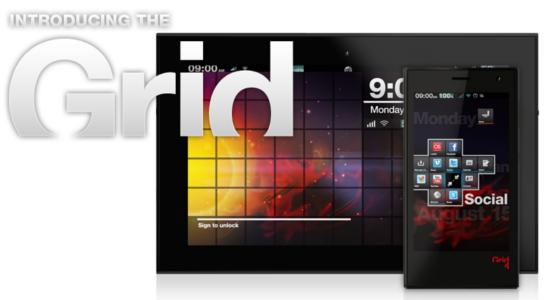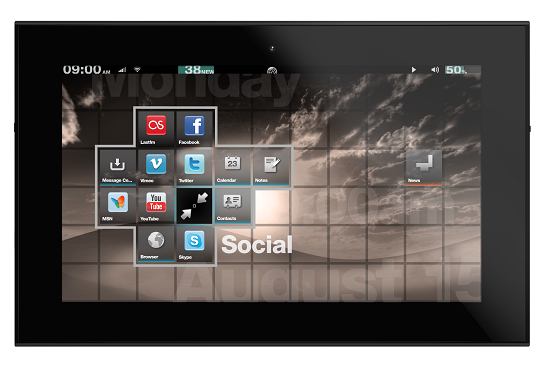
The mobile space is growing – more like exploding – faster than we could have ever imagined. Four years ago, the mobile space was hit with a catalyst, better known as the iPhone. With iOS in tow, Apple showed the world exactly how smartphones should be and what they were capable of. Now a slew of mobile giants have jumped on the bandwagon with mobile platforms of their own. And let me tell you, it's getting pretty crowded.
Google's Android has found its place in the hearts of millions and has shown its dominance in just under three years. Apple is close behind with iOS, bringing mind-blowing application support – now somewhere north of 400,000 apps and quickly growing. BlackBerry OS, webOS and Windows Phone 7 all have their own niche in the market, too. There are also some aging platforms like Symbian that have reached their final phase and will slowly fade away. And bringing up the tail end of the pack, you have upcoming platforms like MeeGo and the newly announced Grid OS.
MeeGo, which is an open source project that has been supported by Nokia for a while, has already been written off by the Finnish company. They made the announcement that regardless of how well MeeGo does in the market, they will not be supporting the OS long-term. Thanks to a partnership with Microsoft, Nokia will be making Windows Phone 7 devices moving forward and well, not looking back.
This leaves Grid OS as the only upcoming mobile platform without an existing fan base, which was announced and shown off just today. (I have a feeling that Michael Arrington is readying his staff of lawyers for this one … or at least throwing a tantrum to the nth degree.) But Grid OS isn't entirely new. Sure, it has been built from the ground up and will bring an completely fresh interface to market, but it is Android-based and will ultimately run apps meant for Google's platform. And that's perfectly fine as Android is open source and this is how Android is meant to evolve, as a collaborative, ever-growing work from anyone who cares to get their hands dirty in the software.
That said, bringing a new platform that isn't completely new seems almost silly at this point. Android is tacking over half a million activations per day and touts over 150 million total worldwide activations. Android also has partner OEMs ranking among the top worldwide cell phone and smartphone manufacturers. And Fusion Garage, who has been secretly hiding behind the facade company, TabCo, wants to bring another platform to market to compete with this?
For those of you who don't know or recall, Fusion Garage is the company that partnered with Michael Arrington (for TechCrunch) back in 2009 to create the CrunchPad. After deciding to release the product on their own and battling through a plethora of lawsuits from Arrington, Fusion Garage proceeded to launch their tablet under the JooJoo nickname. Facing several months of poor sales and other piling issues, the JooJoo was pulled from shelves and swept under the carpet. Here lies problem numero uno.
Fusion Garage is far from a household name and unlucky for them, the few who do recognize the name will inevitably connect them with the aforementioned story. There are easily some people who will travel the unbeaten path to save a dollar or two, but Fusion Garage's prices are nothing to write home about either. The Grid 10 (Wi-Fi) and unlocked Grid 4 will ship at $499 and $399, respectively. The price for the Grid 4 isn't bad in comparison to its unlocked counterparts, but what are the odds that someone looking to save money is purchasing unlocked? Slim. And for the same price, you can pick up either an iPad or Galaxy Tab 10.1. My guess is, few will defect from more well-known platforms for Grid OS, which is an offshoot of the much-loved Android to begin with.

This brings us to software. The alternate Grid layout of the homescreen is nice and upon first glimpse, I actually became pretty intrigued. It is an endless, panning space where you can group applications and expand or collapse each group. It almost resembles a generic, dark-colored calendar app. The problem is, it doesn't seem very intuitive. Even the presenter at faux press conference this morning found himself stumbling around on the homescreen trying to locate the Browser icon. Given time to improve and be built upon, this interface could really catch on, but I suspect some third-party Android developer is already working on that. It's also worth noting that Grid OS looks like a multitasking dream come true, but man does it look cluttered.
The OS is entirely gesture-based. There are no physical or capacitive buttons, which I like. We've actually been looking forward to seeing something like this in either iOS or Android. But even these gestures seemed to give the presenter some trouble through the webcast. Seeing as Grid OS is built off of the Android kernel, it is promised to run Android apps. But according to PC World, phone applications will be centered on the display and tablet apps will appear full-size. The problem? On the the Grid 4, issues should be minimal, but you may occasionally run into a display hiccup. Unlike running an phone app on a Honeycomb tablet, however, the applications will be centered and may face several display troubles. The Grid OS devices will ultimately be fitted with an app store of their own, rightfully dubbed Grid Shop. But expect app selection to be sparse as there is little incentive for big name devs to develop for yet another platform when Grid OS devices can run Android apps.
After watching through several videos, Grid OS looks like it could have some potential. But with underpowered, somewhat overpriced devices, laggy software and a bad market rep, Fusion Garage has a mountain to climb. If webOS, Windows Phone 7 and BlackBerry can't wrangle the beast, who is going to believe the makers of the JooJoo can when they have nothing truly innovative, inspiring or revolutionary to offer?
Let's hear it, pups. Is Grid OS dead on arrival? Or does it have what it takes to run and play with the big dogs?
Images via Fusion Garage, Tablet News